Every year, thousands of South Africans rely on the Road Accident Fund (RAF) to provide essential compensation following road accidents.
But for many, the journey from claim submission to receiving payment is fraught with uncertainty and delays.
Imagine waiting months on end, checking your bank account daily, only to be met with the same disappointing balance.
This frustrating scenario is all too common for RAF claimants, and it highlights the critical need to understand the RAF’s 180-day payment rule.
The purpose of this article is to provide a clear and comprehensive guide to the RAF 180-day payment rule.
We’ll explore the legal background of this rule, the practical implications for claimants, and the significant financial impact it has on both the RAF and those awaiting compensation.
By the end of this article, you’ll have a thorough understanding of the payment process, what to expect, and the steps you can take if delays occur.
In this guide, we’ll cover:
- The RAF 180-Day Payment Rule: What it is and why it exists.
- Legal Background and Court Judgments: Key rulings that shape the current understanding of this rule.
- Practical Implications for Claimants: How the rule affects you and what you can do about delays.
- Financial Impact: The time value of money and interest savings for the RAF.
- Real-Life Case Studies: Stories of claimants navigating the RAF process.
- Claimants’ Rights and Legal Recourse: Your rights and steps you can take if payments are delayed.
- How to Calculate the 180-Day Period: Clear guidelines on calculating this timeframe.
By breaking down these elements, we aim to demystify the RAF payment process, providing you with the knowledge and tools to better manage your claim and navigate any challenges that arise.
Let’s dive in and uncover the essential details of the RAF 180-day payment rule.
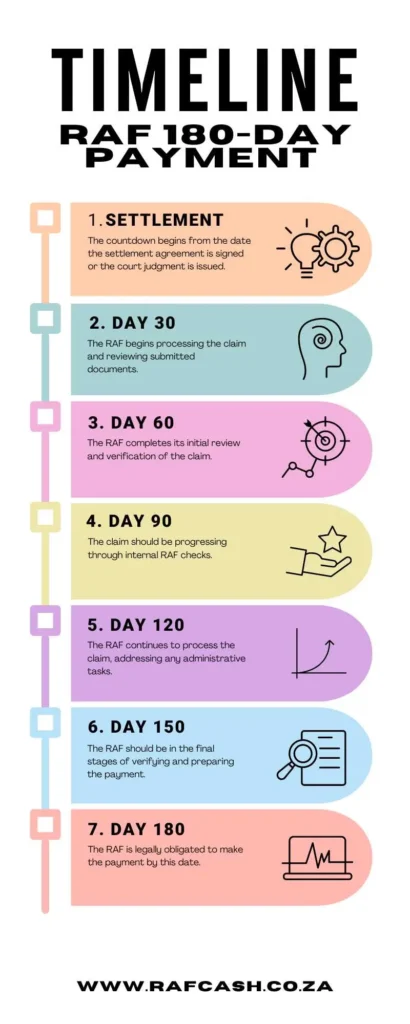
What is the RAF 180-Day Payment Rule?
Definition
The Road Accident Fund (RAF) 180-day payment rule is a policy that mandates the RAF to process and disburse payments to claimants within 180 days from the date a claim is settled or a court order is granted.
This rule is intended to provide a clear timeframe within which claimants can expect to receive their compensation, ensuring some level of predictability in an otherwise lengthy and complex process.
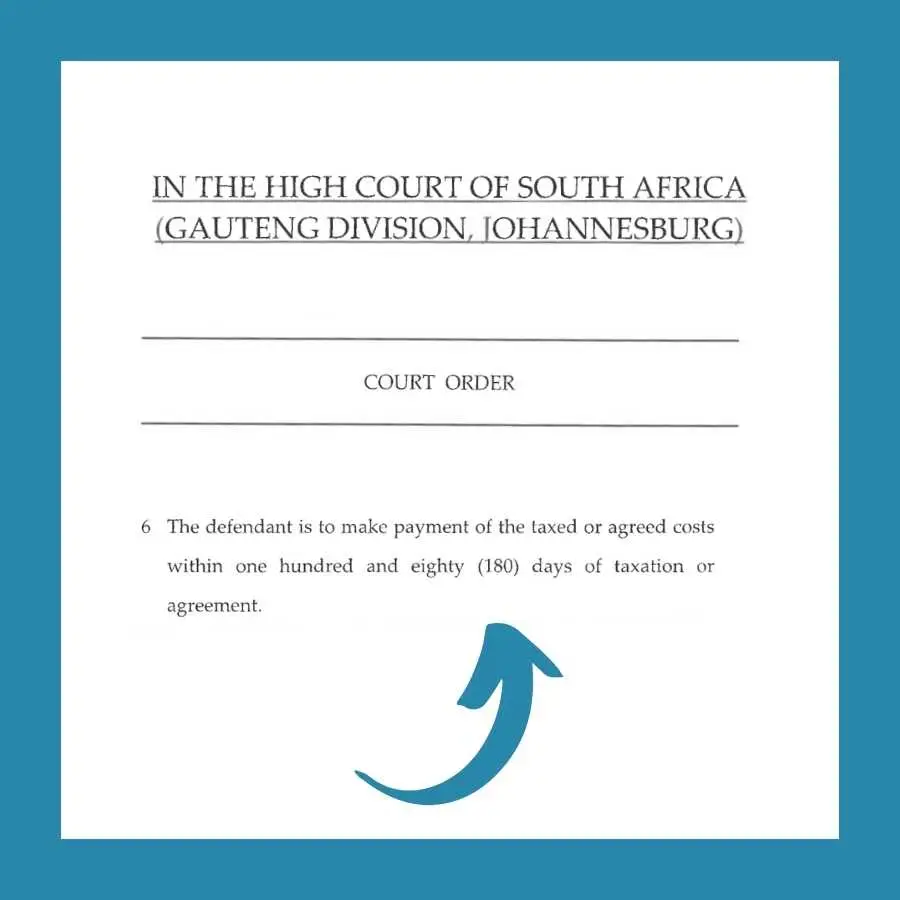
Purpose of the Rule
The 180-day payment rule was implemented to address several significant challenges faced by the RAF, including financial constraints and administrative inefficiencies.
Here’s why this rule is crucial:
- Financial Constraints:
- The RAF operates under substantial financial pressure, managing billions in payouts annually. As of recent reports, the RAF pays out approximately R45 billion in claims each year. Given the volume and value of these claims, immediate payment of all claims would place an enormous strain on the fund’s liquidity.
- By implementing the 180-day payment rule, the RAF gains a buffer period to manage its cash flow more effectively. This delay allows the fund to better allocate resources, ensuring it can meet its financial obligations without jeopardizing its overall financial stability.
- Administrative Challenges:
- The RAF handles a vast number of claims, each requiring thorough investigation and processing. Administrative backlogs are a common issue, exacerbated by the high volume of claims and the need for meticulous review to prevent fraud and errors.
- The 180-day rule provides the RAF with a structured timeline to process claims, helping to manage these administrative burdens. It allows sufficient time to verify claims, conduct necessary investigations, and ensure that all procedural requirements are met before disbursing payments.
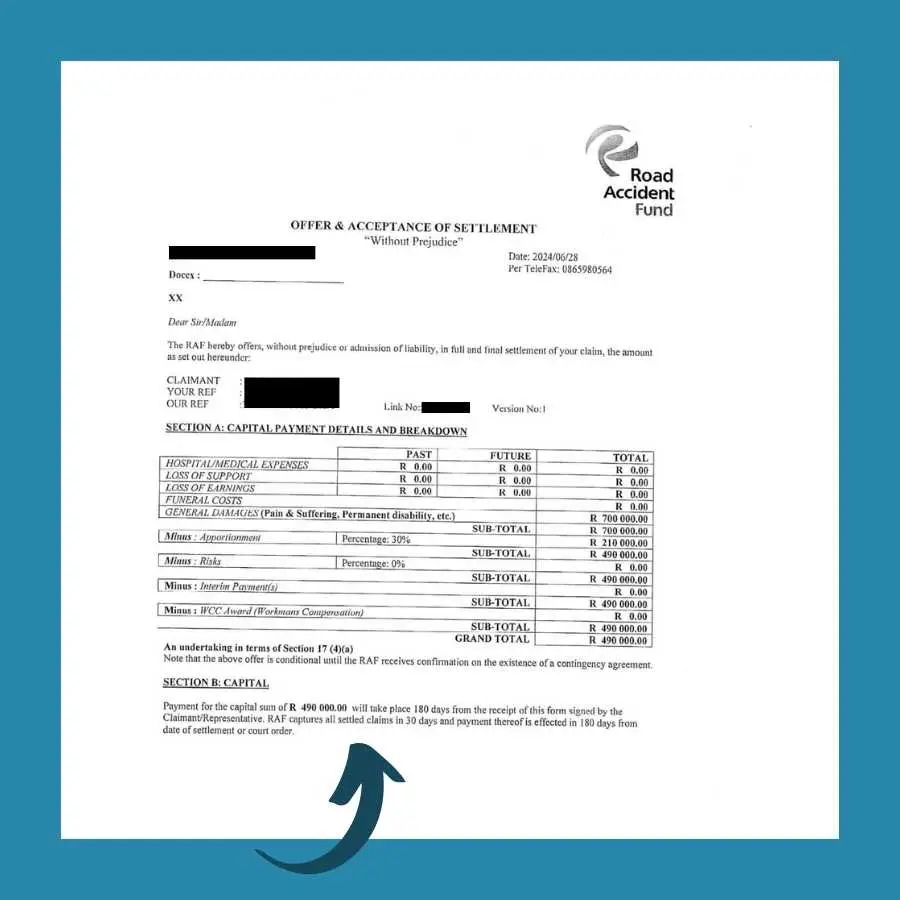
In essence, the 180-day payment rule is a strategic measure designed to balance the RAF’s operational capabilities with the need to provide timely compensation to claimants. While it aims to create a more predictable and manageable payment schedule, it also highlights the ongoing financial and administrative challenges within the fund.
Understanding this rule helps claimants set realistic expectations and prepare for the waiting period inherent in the RAF claims process.

Legal Background and Court Judgments
Key Judgments
Several court judgments have significantly shaped the understanding and implementation of the RAF 180-day payment rule.
These rulings provide clarity on how the rule should be applied and the legal obligations of the RAF.
- Jacobs NO v Road Accident Fund (2022-22121)
- In this landmark case, the court reaffirmed the RAF’s obligation to make payments within 180 days from the date of a court order or settlement. The judgment emphasized that the RAF must adhere to this timeline and that interest on delayed payments would begin accruing from the 15th day following the court order if the payment is not made within the stipulated period.
- The court rejected the RAF’s argument for an extension of the payment period beyond 180 days, stressing that the statutory provisions under Section 17(3)(a) of the Road Accident Fund Act must be followed.
- Rule-16A Notices
- In the case involving the Legal Practice Council (LPC), several Rule-16A notices were issued. These notices allowed interested parties to join the proceedings, highlighting the widespread impact of the RAF’s financial and administrative challenges. The court recognized the exceptional circumstances faced by the RAF and temporarily suspended writs of execution and attachments against the fund for 180 days to stabilize its operations.
- This temporary measure underscored the need for a balance between enforcing claimants’ rights and ensuring the RAF’s financial viability.
- Order of Court – Swanepoel J (09 March 2023)
- This order reiterated the importance of the 180-day rule, mandating that the RAF must pay all claims older than 180 days from the date of the court order or settlement. It also instructed the RAF to provide regular updates on the status of these claims to the involved attorneys and claimants.
- The court ordered the RAF to take immediate steps to list and prioritize payments for all claims exceeding the 180-day threshold, emphasizing the need for transparency and accountability in the RAF’s payment processes.
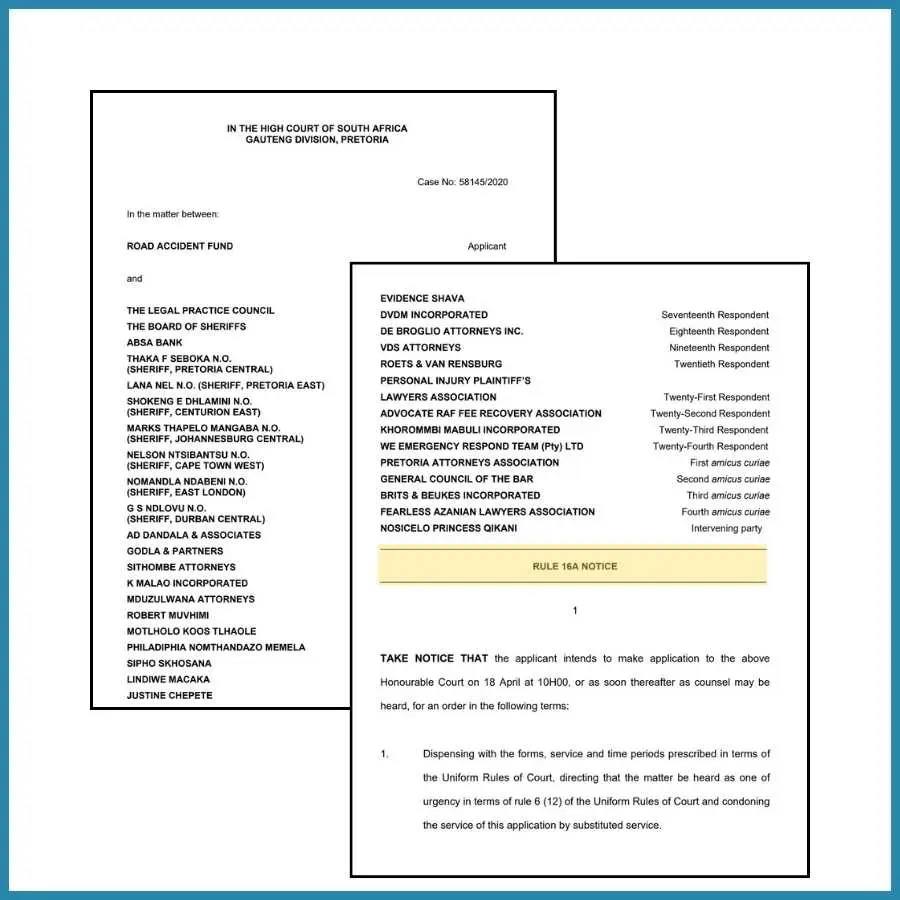
Impact of Rulings
These rulings have profound implications for both claimants and the RAF:
- For Claimants:
- Clarity and Assurance: The court judgments provide claimants with a clear understanding of their rights and the expected timeline for payments. Knowing that the RAF is legally bound to process payments within 180 days offers some level of assurance.
- Legal Recourse: Claimants have a legal basis to demand payment and can take further action, such as seeking a writ of execution if the RAF fails to meet the 180-day deadline. This empowers claimants to enforce their rights and seek timely compensation.
- Interest on Delays: The rulings ensure that if payments are delayed beyond the stipulated period, claimants are entitled to interest on the owed amount. This provision compensates claimants for the financial inconvenience caused by the delay.
- For the RAF:
- Operational Pressure: The RAF is under increased pressure to adhere to the 180-day payment rule. The court’s emphasis on this timeline means the RAF must improve its administrative processes and financial management to avoid legal repercussions.
- Financial Management: The requirement to pay interest on delayed payments adds an additional financial burden on the RAF. This incentivizes the fund to expedite the processing of claims to minimize extra costs.
- Transparency and Accountability: The court orders mandating regular updates and transparent listing of claims require the RAF to be more accountable in its operations. This promotes better communication with claimants and helps build trust in the claims process.
Overall, these legal rulings reinforce the importance of the 180-day payment rule and ensure that the RAF is held accountable to its obligations.
For claimants, the judgments provide a pathway to enforce their rights and seek timely compensation, while for the RAF, they highlight the need for improved efficiency and transparency in handling claims.
Practical Implications for Claimants
Understanding the RAF 180-day payment rule is crucial for claimants navigating the compensation process.
Here’s how this knowledge can help manage expectations, outline legal recourse options, and explain the compensation for delayed payments.
Expectation Management
Knowing that the RAF has up to 180 days to process and disburse payments can significantly help claimants manage their expectations. Here’s why:
- Realistic Timeline: Awareness of the 180-day rule sets a realistic expectation for when payments might be received. Claimants can plan their finances accordingly, knowing that they may need to wait up to six months for their compensation.
- Reduce Anxiety: Understanding the payment timeline helps reduce anxiety and frustration. Instead of worrying about when the payment will come, claimants can focus on recovery and other important aspects of their lives.
- Informed Decisions: Knowledge of the process allows claimants to make informed decisions about their financial planning, such as arranging temporary financial support if needed during the waiting period.

Legal Recourse
If the RAF fails to make a payment within the 180-day period, claimants have several legal options to enforce their right to compensation:
- Court Orders and Interest on Late Payments:
- Claimants can approach the court to compel the RAF to make the payment. The court can order the RAF to pay the outstanding amount along with interest accrued from the date of the award until the date of payment. This interest serves as compensation for the financial inconvenience caused by the delay.
- Writ of Execution:
- A writ of execution is a powerful legal tool that allows claimants to enforce a judgment against the RAF. Here’s how it works:
- Obtaining a Writ of Execution: If the RAF does not pay the awarded amount within 180 days, the claimant can apply to the court for a writ of execution.
- Role of the Sheriff: Once granted, the writ is handed over to the sheriff, an official responsible for enforcing court orders. The sheriff can seize RAF assets to satisfy the judgment amount.
- Enforcement: The sheriff can seize RAF assets, such as vehicles, office equipment, or other tangible property, which can then be sold to raise the owed amount.
- A writ of execution is a powerful legal tool that allows claimants to enforce a judgment against the RAF. Here’s how it works:
- Contempt of Court:
- If the RAF continues to ignore court orders for payment, claimants can seek a contempt of court ruling against RAF officials. This can lead to further legal penalties and increase pressure on the RAF to comply with payment orders.
By understanding these practical implications, claimants can better navigate the RAF claims process.
Managing expectations, knowing the legal recourse available, and understanding the compensation for delayed payments empower claimants to take proactive steps to ensure they receive the compensation they are entitled to, even in the face of delays.

Financial Impact of the RAF’s 180-Day Payment Deferral
The Road Accident Fund (RAF) employs a strategic financial approach by deferring payments for up to 180 days following the settlement of claims.
This delay, while often a source of frustration for claimants, has significant financial implications for the RAF.
Understanding the time value of money and the interest savings achieved through this deferral is crucial in appreciating the broader financial context.
Time Value of Money
The time value of money (TVM) is a fundamental financial concept that reflects the idea that money available now is worth more than the same amount in the future due to its potential earning capacity.
This principle is based on the opportunity cost of holding money, as funds can be invested to generate returns over time.
In the context of the RAF, delaying payments allows the fund to utilize its financial resources more efficiently by investing or managing cash flow more effectively during the deferral period.
Interest Savings Calculation
To illustrate the financial impact of the 180-day payment deferral, we can calculate the interest savings achieved by the RAF using the current repo rate. Assuming the RAF pays out approximately R45 billion in claims annually, the interest savings from a six-month deferral can be calculated as follows:
- Principal Amount (P): R45 billion
- Annual Interest Rate (r): 8.25% or 0.0825
- Time Period (t): 6 months or 0.5 years
Using the simple interest formula and plugging in the values we get:
Interest = R1,856,250,000
Thus, by delaying payments for six months, the RAF saves approximately R1.856 billion in interest. This substantial amount highlights the financial benefit for the RAF, as it effectively reduces the cost of settling claims.

Significance
The financial benefits of the 180-day payment deferral for the RAF are multifaceted:
- Cash Flow Management:
- The deferral period provides the RAF with a buffer to manage its cash flow more effectively. This period allows the fund to allocate resources strategically, ensuring that it can meet its financial obligations without jeopardizing its overall liquidity.
- Investment Opportunities:
- By holding onto funds for an extended period, the RAF can invest the money, generating returns that can further support its financial stability. This strategy helps offset the costs associated with future claims and administrative expenses.
- Operational Efficiency:
- The deferral period gives the RAF time to streamline its administrative processes, reducing the risk of errors and ensuring that all claims are thoroughly vetted before payment. This leads to more efficient operations and potentially lower overall costs.
However, while the 180-day deferral offers significant financial benefits for the RAF, it also has broader implications for claimants:
- Financial Strain on Claimants:
- Delayed payments can cause financial hardship for claimants who rely on the compensation to cover medical expenses, loss of income, and other costs resulting from the accident. The prolonged wait can exacerbate financial instability and stress.
- Legal and Administrative Burdens:
- Claimants may need to take legal action to enforce their right to timely payment, incurring additional costs and administrative burdens. This process can be time-consuming and stressful, further impacting their well-being.
Understanding these financial dynamics is crucial for both the RAF and claimants.
While the deferral period helps the RAF manage its financial obligations more effectively, it also underscores the need for transparency and efficiency in processing claims to minimize the adverse impact on claimants.
Case Studies: Real-Life Experiences of RAF Claimants
Understanding the impact of the RAF 180-day payment rule requires more than just theoretical knowledge; real-life examples bring the rule’s effects to life.
These case studies illustrate the personal challenges and emotional toll experienced by claimants due to payment delays.
Through James and Thandi’s stories, we see the importance of having supportive and proactive financial solutions in navigating and expediting RAF claims.
Case Study 1: James’s Journey Through the RAF Claims Process
James’s Story
James Mahlangu, a 35-year-old father of two from Pretoria, was involved in a severe car accident while on his way to work one rainy morning. The accident left him with multiple fractures and a long road to recovery.
After spending weeks in the hospital and months in rehabilitation, James decided to lodge a claim with the Road Accident Fund (RAF) to cover his medical expenses and loss of income.
The 180-Day Wait
James submitted all necessary documents with the help of his attorney and awaited the RAF’s response. His claim was eventually approved, and he was awarded R500,000 for his injuries and losses. However, the RAF informed him that the payment would be processed within 180 days.
As days turned into weeks and weeks into months, James found himself constantly checking his bank account and reaching out to his attorney for updates.
The prolonged wait began to take a toll on his health and his family’s financial stability. His wife, Nomsa, had to take on extra work to make ends meet, and the family had to cut back on essential expenses.
Turning to RAF Cash
Feeling the financial strain, James turned to RAF Cash Bridging Finance, a service that provides financial assistance to claimants awaiting their RAF payouts. RAF Cash offered James an advance on his pending compensation, alleviating the immediate financial pressure.
This assistance allowed James to cover his medical bills and maintain his family’s standard of living during the waiting period.
Resolution and Reflection
After persistent follow-ups and negotiations, James finally received his RAF payment, albeit four months past the 180-day mark. The delay had caused significant financial strain, but the relief of receiving the funds was immense. Reflecting on his experience, James said:
“Without RAF Cash, I don’t know how long we would have waited. The stress of not knowing when or if we would get the money we desperately needed was unbearable.
RAF Cash stepped in when we had lost all hope.
They provided the financial support we needed and kept us informed every step of the way. I can’t thank them enough for their support and dedication.”

Case Study 2: Thandi’s Struggle with RAF Delays
Thandi’s Story
Thandi Mkhize, a 28-year-old teacher from Durban, was on her way to visit family when she was involved in a tragic car accident. The collision left her with a traumatic brain injury and several broken bones.
Her road to recovery was long and arduous, requiring extensive medical treatment and rehabilitation. Faced with mounting medical bills and an uncertain future, Thandi decided to file a claim with the RAF.
The Waiting Game
Thandi’s claim was eventually approved, and she was awarded R800,000 to cover her medical expenses and compensate for her loss of income. However, she was informed that the payment would be made within 180 days.
As the months passed, Thandi found herself in a constant state of anxiety, checking her account daily and hoping for the funds to arrive. The delay began to affect her mental health, compounding the stress of her recovery.
She had to borrow money from friends and family to cover her ongoing medical expenses and daily living costs.
RAF Cash to the Rescue
Desperate for a resolution, Thandi reached out to RAF Cash Bridging Finance. RAF Cash provided her with an advance on her pending compensation, helping her manage her immediate financial needs.
This support allowed Thandi to continue her treatment without the added stress of financial instability.
Reflection and Relief
While the delay had caused significant hardship, the eventual payment brought immense relief. Thandi could finally pay off her debts and focus on her recovery without the looming worry of financial instability.
Reflecting on her experience, Thandi shared:
“The delay in receiving my RAF payment was one of the hardest things I’ve had to endure. It felt like I was being punished for something beyond my control. RAF Cash was a beacon of hope during this dark time.
They provided the financial support I needed and kept me informed throughout the process. I am forever grateful for their help and would recommend them to anyone facing similar struggles.”
These case studies highlight the personal challenges faced by RAF claimants due to the 180-day payment delay.
Through James and Thandi’s experiences, the critical role of financial solutions like RAF Cash Bridging Finance becomes evident in navigating the complexities of the claims process and providing much-needed relief during extended waiting periods.
Did you know...
- Did you know that the RAF is legally obligated to pay approved claims within 180 days from the date of a court order or settlement agreement?
- Did you know that if the RAF fails to pay within 180 days, claimants are entitled to interest on the delayed payment, which begins accruing 15 days after the payment due date?
- Did you know that by delaying payments for 180 days, the RAF saves approximately R1.856 billion in interest, helping to manage its substantial financial obligations more effectively?
- Did you know that weekends and public holidays are included in the RAF’s 180-day payment calculation, meaning every calendar day is counted towards the payment deadline?
- Did you know that claimants can take legal action such as obtaining a writ of execution to enforce their payment if the RAF does not comply with the 180-day rule?
- Did you know that the sheriff can seize RAF assets if necessary, following the issue of a writ of execution, to ensure that claimants receive their compensation?
- Did you know that the interest rate used to calculate interest on late payments by the RAF is based on the current repo rate set by the South African Reserve Bank?
- Did you know that RAF Cash Bridging Finance offers financial support to claimants who are experiencing difficulties due to delayed RAF payments?
- Did you know that a significant court ruling reaffirmed the RAF’s obligation to adhere strictly to the 180-day payment window, reinforcing claimants’ rights to timely compensation?
Claimants’ Rights and Legal Recourse for Late RAF Payments
Overview of Rights
Claimants who face delays or non-payment from the Road Accident Fund (RAF) beyond the stipulated 180 days have specific rights and legal avenues available to them.
These mechanisms ensure that claimants can enforce their right to compensation in a timely manner. Here are the key rights claimants possess:
- Right to Timely Payment: Claimants are entitled to receive their compensation within 180 days of the court order or settlement agreement.
- Right to Interest on Delayed Payments: If the RAF fails to make the payment within 180 days, claimants are entitled to interest on the delayed amount, which serves as compensation for the financial inconvenience caused by the delay.
- Right to Legal Recourse: Claimants can take legal action to enforce their rights and secure the owed compensation, including filing for a writ of execution and engaging the sheriff to enforce payment.
Legal Recourse Steps
If the RAF does not comply with the 180-day payment rule, claimants can take the following steps to enforce their rights and secure their compensation:
- Consult an Attorney:
- Seek Legal Advice: The first step is to consult with an attorney who specializes in RAF claims. An experienced attorney can provide guidance on the best course of action and help navigate the legal process.
- Evaluate Options: The attorney will evaluate the specifics of the case and recommend the appropriate legal recourse.
- File for Interest on Delayed Payments:
- Calculate Interest: If the payment is delayed beyond 180 days, claimants are entitled to interest on the delayed amount. The interest is calculated based on the prevailing repo rate set by the South African Reserve Bank.
- Submit Application: The attorney can assist in filing an application to the court to claim the interest accrued due to the delay.
- Obtain a Writ of Execution:
- Apply for Writ: If the RAF fails to pay the awarded amount within the stipulated 180 days, claimants can apply to the court for a writ of execution.
- Role of the Sheriff: Once granted, the writ is handed over to the sheriff, an official responsible for enforcing court orders. The sheriff can seize RAF assets to satisfy the judgment amount.
- Enforcement: The sheriff can seize RAF assets, such as vehicles, office equipment, or other tangible property, which can then be sold to raise the owed amount.
- Seek a Contempt of Court Ruling:
- File for Contempt: If the RAF continues to ignore court orders for payment, claimants can seek a contempt of court ruling against RAF officials. This can lead to further legal penalties and increase pressure on the RAF to comply with payment orders.

Practical Tips
Facing delays in receiving compensation from the RAF can be challenging.
Here are some practical tips for claimants to navigate this period effectively:
- Maintain Thorough Records:
- Documentation: Keep detailed records of all communications with the RAF, including emails, letters, and notes from phone calls. This documentation will be crucial if legal action becomes necessary.
- Follow-Up: Regularly follow up with the RAF and your attorney to stay informed about the status of your claim.
- Seek Professional Help:
- Legal Assistance: Engage an attorney who specializes in RAF claims to guide you through the legal process and help enforce your rights.
- Financial Support: Consider services like RAF Cash Bridging Finance to manage immediate financial needs while awaiting your compensation.
- Be Proactive:
- Regular Updates: Request regular updates from the RAF on the status of your payment. This can help ensure that your claim is being processed and reduce the risk of further delays.
- Know Your Rights: Familiarize yourself with your rights as a claimant, including the right to interest on delayed payments and the legal avenues available to enforce payment.
- Stay Informed:
- Legal Developments: Keep abreast of any changes in legislation or new court rulings that may affect your claim. This information can help you understand your rights and the potential impact on your case.
By understanding their rights and the available legal recourse, claimants can take effective action to secure their due compensation from the RAF, even in the face of delays.
These steps and practical tips can help manage the process more efficiently and ensure that claimants receive the support they need during this challenging period.

How to Calculate 180 Days for RAF Payments
Understanding how to accurately calculate the 180-day period for RAF payments is crucial for claimants.
This section explains the process of calculating this period, including the inclusion of weekends and public holidays, and clarifies the start date from which the countdown begins.
Calendar Days Calculation
The 180-day period for RAF payments is calculated using calendar days. This means that every day is counted, including weekends and public holidays.
The use of calendar days ensures a straightforward and continuous timeline without any breaks. Here’s what you need to keep in mind:
- Inclusive Counting: From the day the settlement agreement is reached or the court judgment is issued, each subsequent day is included in the 180-day count.
- No Exclusions: Unlike business days, which exclude weekends and public holidays, calendar days encompass all days in the week and all public holidays within the period.
For example, if your settlement agreement was reached on January 1st, the countdown would include every single day from January 1st through to June 29th.
Start Date
The start date for the 180-day countdown is critical to ensuring an accurate calculation. The countdown begins from either the date of the settlement agreement or the court judgment, depending on which event occurred to finalize the compensation amount.
Here’s how to determine the start date:
- Settlement Agreement Date: If the compensation amount is agreed upon through a settlement agreement, the start date for the 180-day period is the date when both parties sign the agreement.
- Court Judgment Date: If the compensation amount is determined by a court judgment, the start date is the date when the court issues its final order.
It is important to note that the countdown starts from the date these events occur, not from the date the RAF processes or acknowledges the settlement or judgment.
Example Calculation:
- Settlement Agreement: If a settlement agreement was signed on March 1st, 2024, the 180-day period would begin on March 1st and end on August 27th, 2024.
- Court Judgment: If a court judgment was issued on June 15th, 2024, the 180-day period would start on June 15th and end on December 12th, 2024.
Steps to Calculate 180 Days:
- Identify the Start Date: Determine whether your start date is the date of the settlement agreement or the court judgment.
- Count Every Day: Include every subsequent day in your count, without skipping weekends or public holidays.
- Mark the End Date: The 180th day from your start date is the deadline by which the RAF is required to make the payment.
By understanding how to accurately calculate the 180-day period for RAF payments, claimants can better track their payment timelines and anticipate when they should expect their compensation.
This knowledge is essential for managing expectations and taking timely action if the RAF fails to meet the payment deadline.

Conclusion
In this comprehensive guide, we have delved into the intricacies of the RAF 180-day payment rule and its significant impact on claimants. We began by defining the rule and understanding its purpose, which is rooted in addressing the RAF’s financial and administrative challenges.
We examined key court judgments that have shaped the application of this rule and highlighted the practical implications for claimants, including managing expectations, legal recourse options, and the accrual of interest on delayed payments.
We also explored the financial impact of the 180-day payment deferral, demonstrating how it allows the RAF to save approximately R1.856 billion in interest annually, thus stabilizing its financial management.
Through real-life case studies of James and Thandi, we illustrated the personal and emotional toll that delays can take on claimants and how services like RAF Cash Bridging Finance can provide crucial support during these periods.
Additionally, we detailed the rights of claimants and the steps they can take to enforce timely payment, from consulting attorneys to obtaining writs of execution.
We also provided practical tips for managing delays and ensuring thorough documentation.
Finally, we explained how to accurately calculate the 180-day period, emphasizing the inclusion of weekends and public holidays and the importance of starting the countdown from the settlement or court judgment date.
Call to Action
If you are facing delays with your RAF payment, do not hesitate to seek professional assistance. Consulting with an experienced attorney can provide the legal guidance you need to enforce your rights and secure the compensation you are entitled to.
Additionally, services like RAF Cash Bridging Finance can offer immediate financial support to help manage your expenses while you await your payment.
Final Thought
Understanding the RAF 180-day payment rule is crucial for navigating the claims process effectively.
While the waiting period can be challenging, being informed about your rights, the legal recourse available, and the practical steps you can take empowers you to manage the situation more confidently.
By staying proactive and seeking the necessary support, you can better handle the complexities of the RAF claims process and ensure you receive the compensation you deserve.
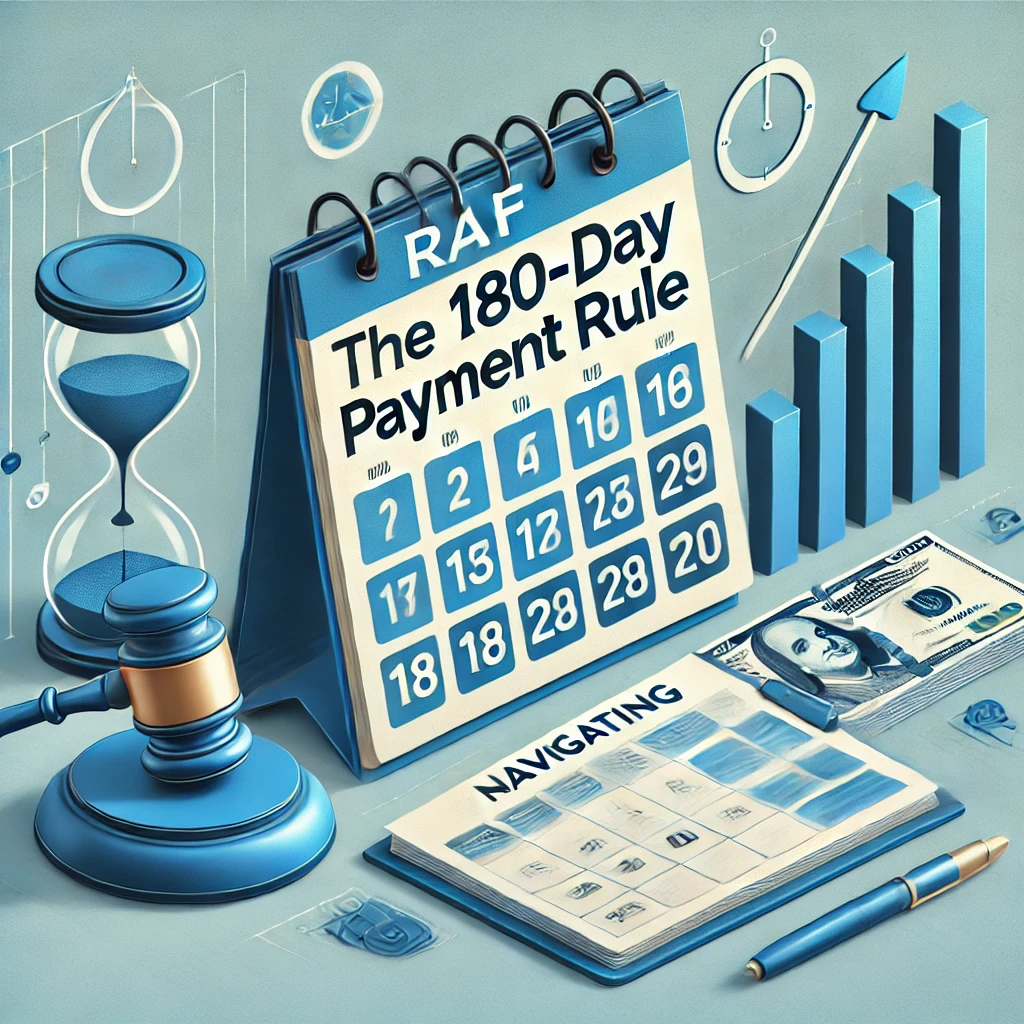
Frequently Asked Questions
What does the RAF 180-day payment rule entail?
The RAF 180-day payment rule requires the Road Accident Fund to process and disburse compensation within 180 days from the settlement agreement or court judgment date.
Why was the 180-day payment rule implemented by the RAF?
This rule was implemented to help the RAF manage its cash flow and administrative resources more effectively, given its financial and operational constraints.
What happens if the RAF does not make a payment within 180 days?
If the RAF fails to pay within 180 days, claimants are entitled to seek legal recourse, including filing for interest on the delayed payment and obtaining a writ of execution.
How is the interest calculated if the RAF delays the payment beyond 180 days?
Interest is calculated based on the prevailing repo rate set by the South African Reserve Bank, starting from the 15th day after the settlement or judgment if payment has not been made.
Can weekends and public holidays extend the 180-day payment period?
No, the 180-day period includes all calendar days, including weekends and public holidays, without any extensions.
What legal actions can I take if the RAF exceeds the 180-day payment deadline?
You can file for a court order to enforce payment, obtain a writ of execution to seize RAF assets, and possibly file for contempt of court if the delay continues without justification.
How can I calculate the exact date by which the RAF should make a payment?
Start from the date the settlement was agreed upon or the court judgment was issued and count forward 180 calendar days to find the due date for payment.
What should I do if I suspect my payment will be delayed beyond the 180-day limit?
Stay proactive by regularly communicating with your attorney and the RAF, and prepare to initiate legal proceedings if the payment does not arrive on time.
How can RAF Cash Bridging Finance help if I’m facing financial difficulties during the waiting period?
RAF Cash Bridging Finance can provide an advance on your expected RAF payout, helping you manage financial needs and relieve stress while you wait for your full compensation.
What should I keep in mind when dealing with the RAF regarding my payment?
Keep detailed records of all interactions and documents submitted, monitor the timeline closely, and don’t hesitate to seek legal advice if you encounter issues or delays.
Glossary
- Settlement Agreement: A legal agreement reached between two parties in a dispute, resolving the claim without a court judgment.
- Court Judgment: A decision made by a court at the end of a lawsuit, which determines the outcome of the claim.
- Repo Rate: The interest rate at which the central bank of a country (South Africa’s Reserve Bank) lends money to commercial banks.
- Writ of Execution: A court order granted to enforce a judgment obtained by a creditor against a debtor, allowing for asset seizure.
- Sheriff: An official responsible for enforcing court orders, including the seizure and sale of property to satisfy a judgment.
- Interest on Delayed Payments: Additional money owed to a creditor as compensation for a payment not made on time.
- Claimant: An individual who makes a claim for compensation due to losses suffered, often in legal or insurance contexts.
- Legal Recourse: The right of a party to seek a legal remedy or enforcement of rights from a court or similar legal entity.
- RAF Cash Bridging Finance: A financial service that provides claimants with an advance on their expected compensation from the RAF.
- Contempt of Court: An act of disobedience or disrespect towards the court, which can lead to penalties or fines.
- Compensation: Payment awarded to someone as a recompense for loss, injury, or suffering.
- Financial Strain: Economic stress or burden experienced by individuals or families due to insufficient funds to meet needs.
- Legal Proceedings: Actions taken within the judicial system to resolve disputes or enforce laws.
- Claim Process: The series of actions a claimant must undertake to seek compensation or remedy in a legal or insurance setting.
- Due Date: The specified date by which a payment, task, or action is required to be completed.




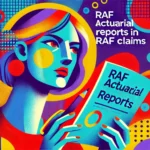

2 Responses
The settlement date to 180 for payout is 21st June 2024 to 21st December 2024, is that the correct? If so, my lawyer says when my settlement is paid, they will calculate their 25% as agreed, however instead of giving the rest afterwards they say they will pay me 60% of my lumpsum at the time, and keep 40% for +/- 18months because they would not paid by RAF in the 180 days for the “BILL OF COST” My point is, I then called RAF offices and inquire. Their response was that my Lawyer is paid by RAF not by holding my 40%, and they know that, they are required to submit their bill of cost when the 180days rule start. In my case as we speak my lawyer also told me that unfortunately they haven’t yet submitted the bill of cost since the 21st of June 2024. We are now in dispute because I told him RAF is responsible for their payment not me, his answer was “that’s how thing work”. My question was, that’s how things work for who? I have been out of work for 5 years in June of 2024 and I’m desperate to why is this happening. Please help me and advise accordingly. Thank you. My email address is :[email protected] and my mobile is 0817611533 Thank you
Hi there can you be at fault from reckless and negligence of the Taxi driver, if you are pedestrian and you were crossing road